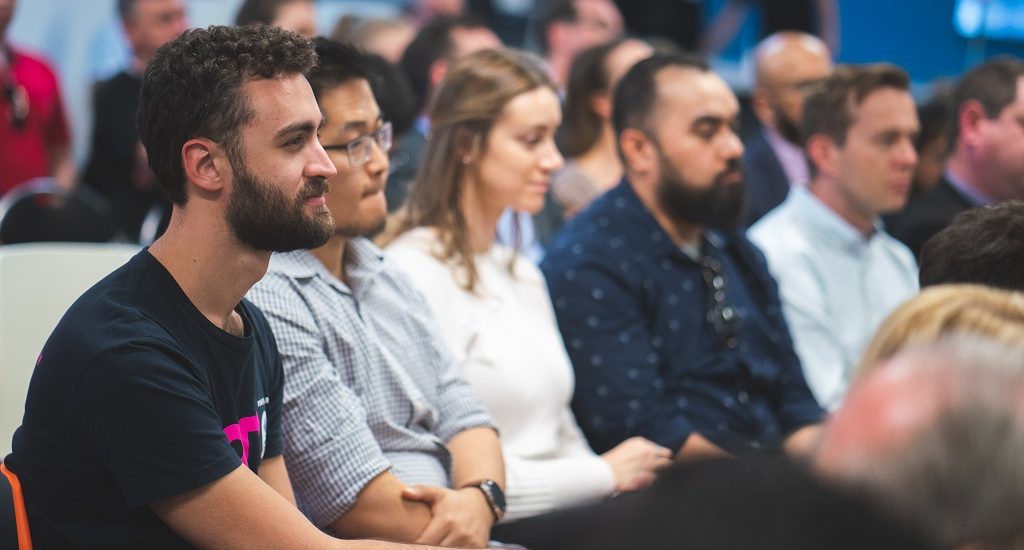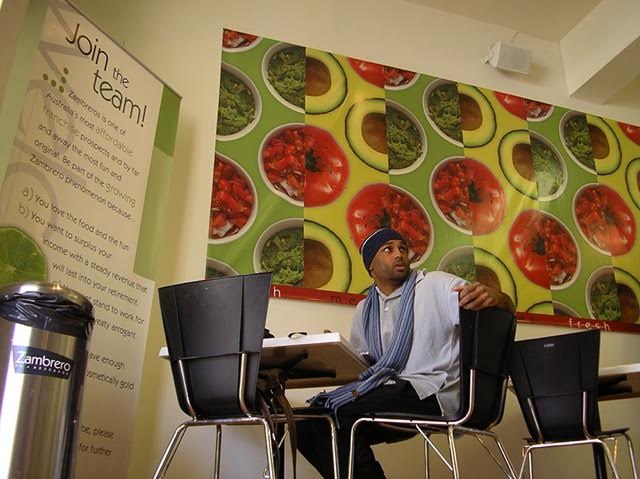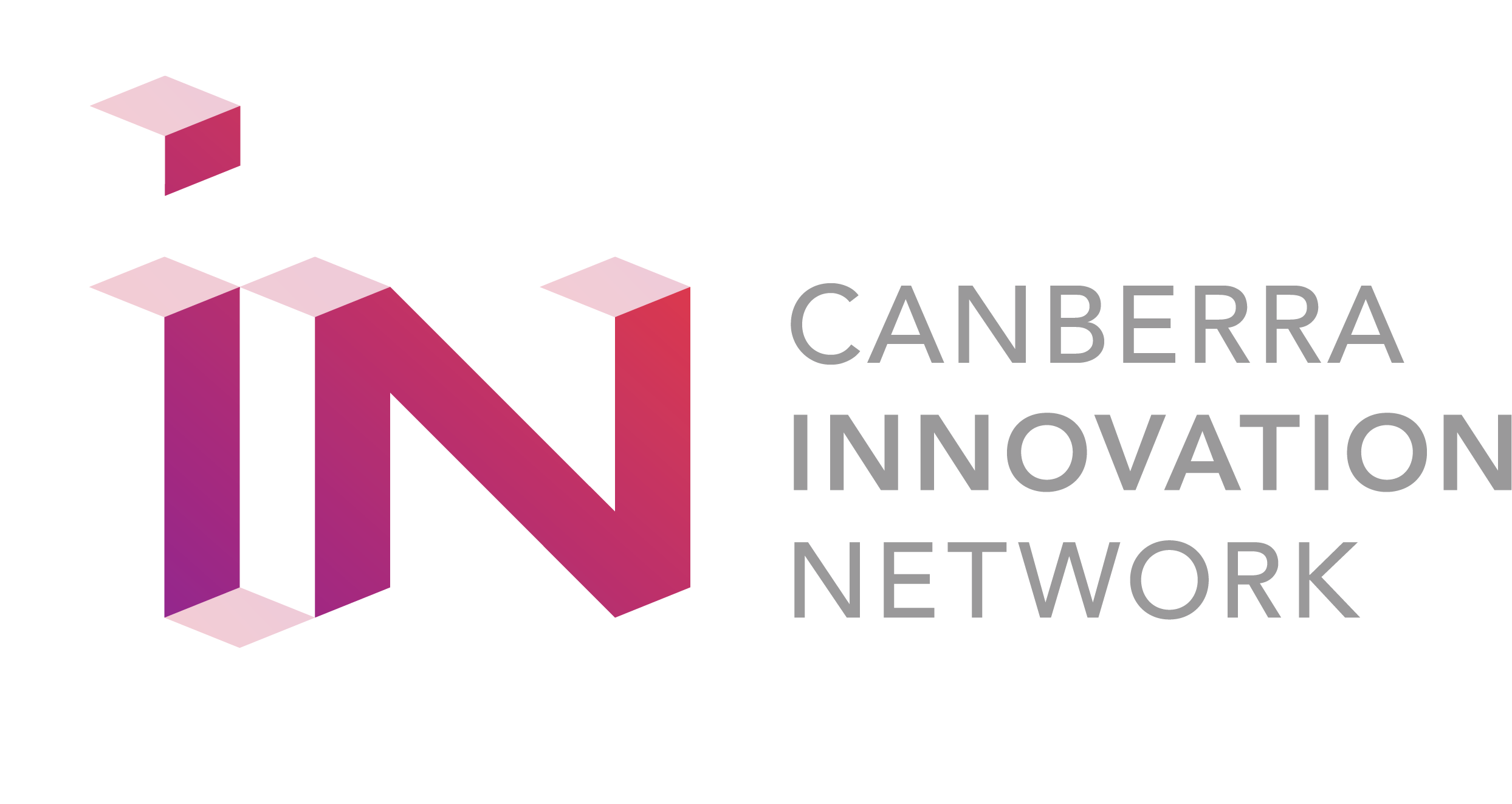- 12 October 2021
- Posted by: Canberra Innovation Network
- Categories: General News, Weekly Innovation Challenge

As part of the Canberra Innovation Network’s commitment to supporting our community of entrepreneurs during the ACT lockdown, we’ve reinstated our popular Weekly Innovation Challenge. The Weekly Innovation Challenge is for every entrepreneur, founder and business leader. If you’re growing a business, developing a product or just want to change the world, our goal is to show you relevant new ideas and challenge you to rapidly try them out. Every Lockdown Monday at 2pm we will introduce a topic, host guest experts, allow room for questions and end by setting a useful, actionable challenge for you to work on.
In the seventh instalment of the Weekly Innovation Challenge we hosted Anne-Marie Perret, Advisor to high growth companies, Board Member & Investor. She and our own Dr Craig Davis spoke about their own experiences as mentors to entrepreneurs, and gave us advice on what we can do to make the most of those relationships. A big thank you to everyone who participated, and be sure to come back next Monday when we’ll be talking with several successful ICON grant recipients to learn how to raise capital to build prototypes.
NB: Below we share notes taken from the live meeting. This is not a transcript and these are not direct quotes; for those, refer to the video above.
Welcome to #7 of our Weekly Innovation Challenge series! These one-hour webinars are meant to help take you outside of your day-to-day while giving you some fresh thinking and support.
This week we’re pleased to be joined by Anne-Marie Perret, who generously shares her time as an advisor and mentor with a long list of entrepreneurs. During this hour she and Craig help us work out how to get the most from those (sometimes tricky) relationships.
“The delicate balance of mentoring someone is not creating them in your own image, but giving them the opportunity to create themselves.” Steven Spielberg
Remember that the right mentor:
- has relevant experience
- understands startups
- forms a connection with you
- is realistic
- challenges you
An alignment of values helps frame all of the above, but keep these key thoughts in mind. You should also have mentoring relationships with a few different people.
In mentorship, the relationship is driven by YOU (not your mentors). So seek conversations out! Actively decide to focus on the relationships that you’re getting something from.
Meeting prep tips:
- Do you know what they’ve done? Research their background
- Decide on goals or specific issues
- As questions, explore reasons, dig deeper (“I think I understand that – does it mean THIS?” Drill down. Anecdotes make for great, powerful examples)
- Take notes! These will help with further reflection
There ARE risks!
- Be skeptical
- Get multiple viewpoints
- Don’t leave critical tasks to others
- Remember that YOU are the leader and YOU decide
You aren’t approaching people and saying “Tell me what to do” (you comply with steps given by your accountant, sure…) but rather understand no one knows your business like you do and you are here to learn, then decide to follow advice OR NOT.
“Governance” – having a company board, can trickle down to elements of what you do within your company
Consider the example of Clyde and Dayne Rathbone. Clyde, a pro rugby player, and his brother Dayne, a profesional comedian, had a really out-there idea. They went about testing their concept with a huge number of people, and got bad press for it. They were open about how to achieve the goal and pivoted many times. They passionately believed in their goal but were totally open to how to achieve it. No mentor whiplash – they talked to a lot of people (Clyde once told Craig that when you make a mistake on the rugby field in front of thousands of people, they’ll let you know about it, so don’t sugarcoat!). They worked out what worked for them, they allowed people to tell them their baby was ugly when they introduced it to the world. They were passionate and driven but dispassionate about how they got there. And they engaged widely.

You may have a mentor with whom you have just one meeting! Someone you interact with in the gym, someone you sit next to at an event, and that one meeting can still have value. Dr Sam Prince, founder of Zambrero, was just a local Canberra student when he decided to start his business. BUT the key to his success? He was all about the Power of the Second Question. Anne-Marie started working with Prince around 2008 when he had five stores. Now he has over 200, in multiple countries, and has donated roughly 52 million meals to those in need through his charity (at the time of publication, October 2021). His key to success is always asking a second question, to find out about what makes the person he’s talking to tick.

Be lateral! That’s where you learn the most – from lateral conversations.
How do you approach a mentoring relationship? Depends on the person. Some are time poor and want you to come with specific questions. But for others its about understanding the people and forming that connection. Sure, have questions, but the focus is more the conversation. Build a relationship and your mentor will know to ask the questions you didn’t have questions on for them! And by having different types of mentors you’ll learn different things.
Remember, YOU are in charge here. This isn’t school – you shouldn’t be looking for prompts and tests. If you want good mentoring, you need to drive it.

Mentor Whiplash: Two mentors can give two different paths of advice; sit down dispasstionately and see how advice fits into your own skill set and your company’s goals. And sometimes go to a third mentor to settle which way to go with the first two!
There’s no harm in a mentor challenging you. Sometimes the people you don’t get on with are the ones you need 🙂 It’s always easier to get help from people you get on with, but the most important facet is that your mentor feels like they can be honest with you. If you’re an entrepreneurial CEO you’re ready to have a tough job, so you need to be able to have people check you. If you’re feeling uncomfortable with advice stop and think about why the advice is making you feel uncomfortable. Mentors are there to help YOU bring out the best in you.
When your mentor is life-wise but not knowledgeable about your particular industry, how do you manage that? You can choose your mentors for different things. If you know your industry do you really need your mentor to? Or do you need their help with how to grow a company? How to XYZ? Look at what you want from them. Industry knowledge is about experts, rather than mentors sometimes. A mentor might be able to help you find experts.

Before you give a part of your company away to a mentor, consider an advisory board. You can invite people to an advisory board without risk of liability. But also go to events like First Wednesday Connect and have those “second question” conversations to informally seek out mentors. Starting a relationship with payment might see you locked into a relationship that doesn’t work for you.
When you have regular catchups but don’t have a burning question for your mentor, what do you do? Anne-Marie suggests finding out what works for your mentor. You don’t always need to solve a problem. If in doubt, ask for permission (“Can we just have an unstructured chat?”) as sometimes the best insights come from those unstructured chats.
“I’d really love to seek your input” is another way of gaining a mentor … who can be converted to an investor!
How do you foramlize a mentor / mentee relationship? Keep things informal, and if you want to get more formal take them out to coffee and say, “I’ve learned so much, I’d be flattered if I could formally blahblahblah” – if you’ve built that relationship and they’re already answering some of your questions, chances are they’ll be honoured to learn they’ve provided you with value. “I’m really enjoying this, can we do it more” type of thing. But know that you may be told NO. And don’t look for someone to work for free in what should be a paid role.
Thank you, Anne-Marie and Craig!
Be sure to join us next week, when we’ll talk to successful recipients of the ICON grant and learn about funding and developing prototypes, and for our final weekly challenge meet with Tim Hirst who will help you ensure you’ve got all the boxes ticked in order to set up your startup correctly.
Week 7: Do I have the right mentors to bring my innovation to life? What do I hope to gain from each mentor relationship and how am I going to drive things in that direction?
Week 6: What’s something I can take away from this conversation and bring to my team? How can I better understand the humanity they bring to my organisation? Go back to your team, imagine Renee sitting next to you, and think about what you’d say or ask to make everyone feel safe, heard and understood?
Week 5: What can I do for my business to improve my money management? That might be downloading some software or having a convo with my accountant …
Week 4: Have a hard look at what you can offer a potential investor and decide if you’re ready, or need to do some more work first. Once you’re ready put together a dream list of a half-dozen investors and practice your pitch on a mirror and on your lockdown bubble.
Week 3: Sign up for one of the free trials mentioned above and test it out on your site. If you’re averse to that, identify a friend who isn’t familiar with your site and give them the five-second-challenge, then implement a change you learn is necessary from what they spot.
Week 2: Identify the ONE thing you can do better for your customers, and just bloody do it!
Week 1: Realise one problem I have and share it with someone I trust (“I’m not sure what to do about XYZ” or “I’m worried about ABC”). Saying it out loud is sometimes all I need to do! But other times the input from my team, a friend or another member of the innovation community with an understanding of my industry is just what I need to solve this.

